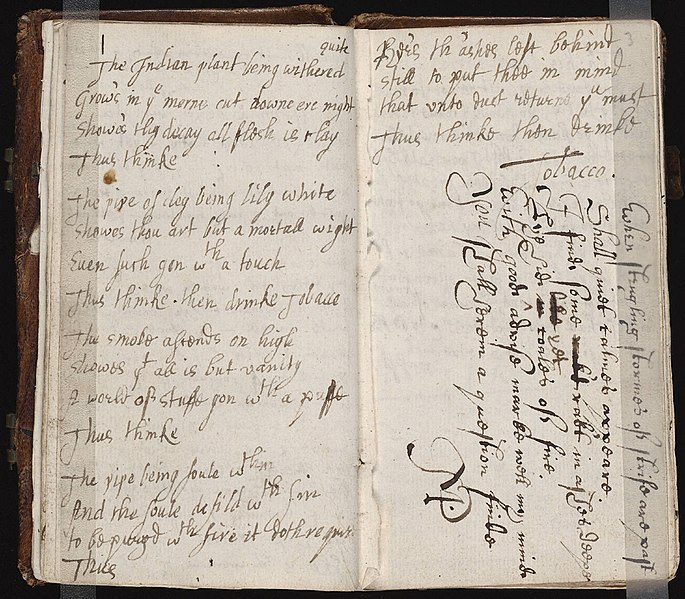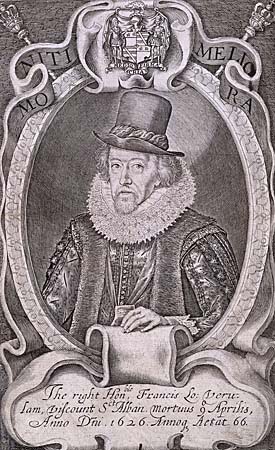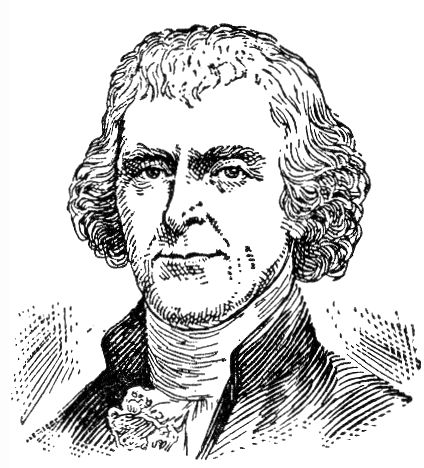An example of a seventeenth-century English commonplace book. Most authors chose only one page orientation for their entries.
We like to think, here at the Cabinet, that the modern-day blog is a form of Commonplace Book (especially that garbage over on Tumblr®). What is a commonplace book, you ask? A product of Europe's early modern Renaissance, the commonplace book was a sort of diary where one recorded favorite or interesting passages or quotes from one's reading. It's also something like a scrapbook, except early modernists didn't cut up their expensive books or spare their newspapers from fish-wrappings to paste favorite excerpts into a commonplace book.

The practice spread to England in the sixteenth century, then to the British colonies of the New World. Although it declined in popularity by the nineteenth century, commonplacing gives us a better idea of what the 5% of the population that was literate was reading! Often, however, commonplacers did not give proper attribution to the quotes they recorded. :(

Erasmus, the great humanist and technophile, using a vintage Crapple Macintrash to commonplace.
Four out of five Founding Fathers recommend keeping a commonplace book. DO YOU?
The commonplace, they say, demonstrates that seventeenth-century English style of reading was much like the brain-addled web-centric reading of today, jumping from piece to piece instead of reading completely or straight through. Take that, Nicholas "Shallows" Carr!
Some sixteenth-century worthies that you might have heard of wrote instructional manuals on keeping commonplace books, including the Dutchman Desiderius "Erasmus" Roterodamus (1466-1536), and Englishmen Francis "Not the Screaming Pope Guy" Bacon (1561-1626), and John "Rape of the" Locke (1632-1704).
A Holbein portrait of Erasmus holding his personal commonplace book, mysteriously called Hpakaeloi Ponoi.
Erasmus' handbook was called De Utraque Verborum ac Rerum Copia (Foundations of the Abundant Style), and, although few commonplace neophytes followed his advice to "scribe in lingua mortua, in optimum vitulum cutis," it proved enormously influential to English-language commonplacers.
Francis Bacon, hat connaisseur and commonplacer extraordinaire.
Some examples of Bacon's cutting observations, gleaned from his wide reading, on the human condition:
- "By far the largest portion of hellebore should be given to the covetous."
- "It is disgraceful for a suitor to solicit his lady's handmaid, but praise is the handmaid of virtue."
- "Better children weep than old men."
- And: "The rowling stone never gathereth mosse."
John "Rape of the" Locke, avid commonplacer
John Locke, the great, wheelchair-bound political philosopher, though often occupied pursuing life, liberty, and property, kept a commonplace. He even had a spin-off commonplace with quotes drawn only from the Bible.
Here are some select passages from Locke's commonplace:
- "They that change their religion without full conviction, which few men take the way to and can never be (without great piety), are not to be trusted, because they have either no God or have been false to him, for religion admits of no dissembling"
- "One should not dispute with a man who, either through stupidity or shamelessness, denies plain and visible truths."
- "Let your will lead whither necessity would drive, and you will always preserve your liberty."
No stranger to the Cabinet, William Byrd II used the commonplace books as one of many outlets for his unbridled PATRIARCHAL RAGE.
American colonists brought their commonplace book with them, although many became waterlogged with seawater or were eating by starving passengers. The Virginia plantation patriarch William Byrd II (1677-1744), he of the great Westover Plantation and flourishing on the billiard table, kept one of the more famous examples from colonial America. (Byrd II also kept a secret commonplace book, written in code, that recorded only sexually explicit anecdotes and X-rated bawdy jokes.) Sadly, he did not record the sources for his quotes.
Some of Byrd's more salient recordings include:
- "Goats milk is accounted better than Asses milk in a consumption, and a wholesome womans milk better than either." (LOL!)
- "The Virtuosi who Study the nature of their Fellow creatures affirm, that a mule cannot only carry a great deal upon his back, but also a great deal in his head, for not Quantity of strong drink will make him drunk."
- "When 2 Beggars marry in France they call it a Match betwixt hunger and thirst, or between Famine and nakedness."
One of two self-portraits of Jefferson done on his patented Polygraph machine.
Byrd's fellow Virginian Thomas Jefferson, the poor man's John Locke, also kept a commonplace book. In fact, he constructed most of the Declaration of Independence in his glass-walled and mysteriously clean room at a Philadelphia boarding house by using excerpts from his commonplace book. And if I could find Jefferson's commonplace book for free online I would quote at length from it, but I can't, because IT WASN'T PUBLISHED UNTIL 1928. Damn you, public domain date of January 1, 1923!
Perhaps you're beginning to think that only rich white dudes kept commonplace books. If you are, you're mostly right. No one else could read! Or had books! Or could make quill pens! But just because the commonplace book was the playground of the rich and famous doesn't mean they aren't cool. They're early modern mix tapes, except without the music, or the '80s nostalgia.
Until next time, the Cabinet is closed.


_445.jpg/433px-Die_Gartenlaube_(1876)_445.jpg)





You're cute.
ReplyDelete